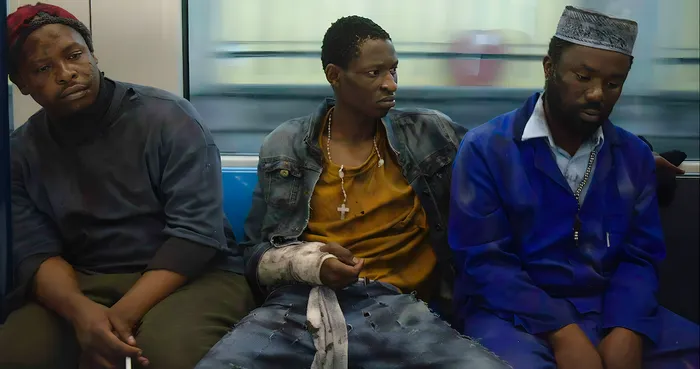'God’s Work': voices from the streets of Durban
A film shedding light on the homeless

Simphiwe Thobani Nzuza, from left, Thobani Mbulelo Radeba and Khaya Zenzo Msomi in a scene from the movie.
Image: Supplied
“When you're on the streets, people look through you. I'm tired of being invisible.”
The words above are from a homeless character in God’s Work - the home-grown Durban film that opened this week at the Durban International Film Festival. But though they were spoken by an actor, Mbulelo Radebe, they could easily have been the actual words of one of the 6 000 or so homeless men and women in Durban.
If the size of that number shocks you, it is because the quotation is very true: homeless people in our city are invisible.
God’s Work was written and directed by DHS-alumnus Michael James in his first full-length feature film. James was inspired to make it, while volunteering at the Denis Hurley Centre (DHC) during lockdown. It was a time when the DHC, was working with the municipality and other NGOs to organise emergency shelters for 1 500 people across Durban, as well as hosting 100 sick and disabled homeless men in our own building.
James spent time getting to know the homeless men in residence. A few of them started telling him about an idea they had for a story, and, to their delight, he worked with them to make a 20-minute video which they conceived and wrote, called No Kings on the Streets, which can be viewed on the DHC YouTube channel.
The more James chatted with them, the more moved he was by their own stories and their feeling that no one was interested in hearing their voices. From this original interaction, the film God’s Work was inspired. Five years later it has received the red-carpet treatment at its world premiere at the CineCentre at SunCoast. Present were not only the filmmakers and actors (many of them graduates of DUT’s drama programme) but also homeless men who acted as paid consultants during the filming process to advise James on how to present the story in an authentic way.
The film portrays a "warts and all" view of homeless life in Durban – drug addiction, the temptation to hopelessness, police violence, exploitation by politicians, religious platitudes, and well-meaning but inept interventions by do-gooders. In the face of all this, there is a resilience and a camaraderie between the six main characters.
Although the film is catching the interest of Hollywood-types, it does not give in to a happy-ever-after ending. The director explains that he wants the film to be an experience of walking alongside the homeless men – so it is sometimes slow-paced, sometimes highly chaotic; does not give us a tidy solution, but leaves us with a sense of unease, and questions to be answered.
One young woman at the opening night commented in tears: “This film leaves me very uncomfortable; but in a good way.”
Executive Producer Toni Monty commented: “It is not a film about homelessness. It is a film about a group of fascinating men, who find themselves homeless.”
And that is why the quote at the beginning is so poignant. As someone who works every day with a group of booksellers all of whom were once homeless, I know from my own experience that these men and women have profound backstories and inspiring dreams for the future. Perhaps that is why they make such good booksellers. They know the power of a good story; but they also know how many stories go unheard or unread.
Before we set up the Street Lit bookselling project, the DHC worked (with Independent Media, the publishers of the POST) to empower homeless people as newspaper sellers. I remember listening to Lindani, the vendor who was working at the robots at the top of Swapo Road (Broadway) in Durban North. He explained that he had stood begging at those same robots for years; then, when he became a newspaper seller, things had changed.
“It is not that I make any more money now than when I was begging,” he explained.
“But before I would watch as people sped past me, praying that the lights would stay green, or refusing to look at me if they were caught by the red light. Now, I see the same cars on the same school runs or commutes to work, and yet something has changed. Now, they actually look forward to a red light, so they can put down the window and greet me. And even if they don’t buy a newspaper, they have made a difference in my day: because they have seen me; they have recognised me as a fellow human being.”
There is a strange irony that homelessness is so visible as a problem and yet homeless people themselves feel invisible. The recent response of eThekwini Municipality – despite the positive work they did during the Covid-19 lockdown – is to try and make them even more invisible. Once again, they are picking people up off the streets and dropping them far from the city. And their latest expensive plan is to relocate some of the city’s homeless people to a disused prison site in Lower Illovo. A kind of out-of-sight, out-of-mind philosophy, which feels almost certain to fail.
There are promises of ongoing support for the homeless once they have been relocated – but eThekwini have rarely followed through on this in the past. Meanwhile, there is no thought on their need to find purpose, and earn money, however modest, to stay alive. And all the while, there are government buildings in our inner city which are empty, that it would make far more sense to utilise.
Our work at the DHC – and the work of iCare and other members of the Durban Homeless Network – is not about making homeless people invisible. We start by helping homeless people in practical ways by serving meals and providing healthcare. Then we also make sure that they have IDs, that they are registered as voters, that they have a chance to speak for themselves on radio and TV; and now, portrayed by actors, their stories are being seen on film.
There will be a free screening of God’s Work this Saturday, July 26, at 1pm at the DHC and all are welcome to join us. Email: [email protected] for more information.
We will have a chance to celebrate the homeless men who appear as extras in the film, and also hear from the producer, Sithabile Mkhize as well as the director. Importantly, after the screening, there will be a chance for people to talk in small groups with the homeless people present and hear their voices directly.
Even if you cannot make it on Saturday, you have many other chances to hear about what life is like on the streets of Durban. Just speak to any of our band of Street Lit booksellers whom you will find in bright green shirts across the city: in malls, at theatres, at Botanic Gardens and other pop-up venues.
It is through truly listening to the stories of others – on film or in real life – and being open to what they tell us even when it is not a Hollywood ending that change can happen. The life of the person telling the story can be transformed – and so can the life of each of us when we have the privilege to listen.
There are several more DIFF screenings of God’s Work:
- Saturday, July 26, at 1pm at the DHC (free)
- Sunday, July 27, at 5pm at Ster-Kinekor, Watercrest
- Saturday, August 2, at 12 noon at the Bioscope, Johannesburg
- Sunday, August 3, at 12 noon at the Labia Theatre, Cape Town

Illa Thompson
Image: Supplied
Illa Thompson co-ordinates the Denis Hurley Centre Street Lit project and is the DHC publicist. She owns Publicity Matters, a Durban based PR agency.
** The views expressed do not necessarily reflect the views of IOL or Independent Media.